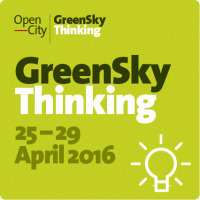'Beyond the Bonfire': Green Sky Thinking 2016
By Jess Hrivnak
27 April 2016

The discussions at Max Fordham’s Greensky Thinking Event Sustainable Housing: Beyond the Bonfire last night were filled with encouragement.
It acknowledged that despite the lack of legislative will, the value and merit of sustainability issues beyond energy efficiency have powerful advocates in the industry. Bill Gething set the scene, giving us a potted history of housing sustainability legislation since 2006. The sombre tone was lightened by the encouraging news on Monday that the House of Lords have overturned the Commons scrapping of the zero-carbon target. We are yet to see how the strong desire to resurrect the target will play out.
Even with this encouraging back track, the scrapping of the Code for Sustainable Homes last year means that other sustainability issues such as ecology, materials, community infrastructure and as-built performance are already being sidelined.
Four speakers took to the floor to make a pitch of why each of those topics is important and why we cannot afford to ignore them despite the lack of legislative pressure:
Tom McNeil (Max Fordham) highlighted recent studies showing the Standard Assessment Procedure (SAP) predictions bear no correlation to the monitored per/sqm carbon emissions in housing. Tom pitched the case for concentrating our efforts into reducing the actual carbon emissions through advocating better quality of installation and commissioning, and engaging with occupants on how they their homes.
Kell Jones (Useful Simple Trust) advocated for Government intervention to bring about embodied carbon measurement in housing projects. He made the case that only such intervention would stimulate the manufacturing industry to invest in ways of reducing the carbon impact of their products as well as developing new materials. Investment from manufacturers would be good for the economy, good for us and good for the planet.
Dinah Bornat (ZCD Architects) pitched for the importance of useable, valued, recreational, external space. Citing research on how the lack of well designed external space is impinging not only on our mobility but also on our childrens' independent mobility, Dinah promoted external space to be designed as a network across neighbourhoods, distributed within the scheme rather than on the edge, with direct access from dwellings. She cautioned that her research found that the oft promoted ‘shared space’ approach was not delivering the desired results, spaces in fact being overtaken by cars.
Tim Osborn (to-studio) gave an oversight of the incredible richness that ecology gives us. Using a single tree as an analogy for the value of ecology and greenspace, he noted the beauty that a tree provides through its sculptural form, seasonal variation, and scale. In addition, the tree provides health and wellbeing benefits, sense of place, habitat, climate change adaptation, and has demonstrated economic benefits in real terms by increasing land values, increased rental premiums as well as the crop value.
Following the 5min expert pitches, Hero Bennett and I introduced the workshop element of the evening. Taking the format of Max Fordham’s Sustainability Matrix we explored the four themes in groups and asked attendees to establish what the Best Practice standard is under each, and what they would consider as 'Pioneering'. Contributions were spirited, with examples being cited of when things went well and how this could be replicated as a Best Practice standard. Event attendees had fun completing their aspirational Pioneering targets- suggesting a longterm vision and direction of progress.
In the concluding debate it emerged that different sustainability topics warrant varied responses. That is to say currently there is evidence that a market driven approach to public space and parts of ecology is delivering sustainability benefits. However, the greening of materials will require legislative intervention, as the business case for improvement does not exist in the construction industry.
Hero Bennett and Jess Hrivnak would like to thank the four speakers and Bill Gething for chairing, as well as all the attendees for their valuable contributions.





.jpg)
Comments
Add a comment